Interview with Ricochet
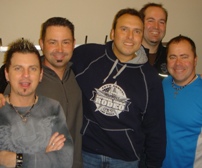
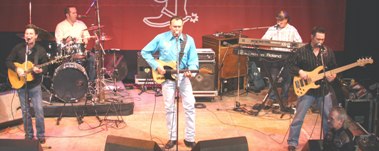
After that it was a little quiet around the band (at least over here in Europe)
but now they are back full steam ahead. While they were performing in Zurich
I took the opportunity to talk to Heath Wright and Greg Cook.
BM:
Heath, you wrote songs back in the nineties such as What You Leave Behind
but you also had songwriters on your albums that are known stars themselves
today, such as Derryl Dodd with Baby Hold On. What can we expect
on an upcoming album? Own songs or other songwriterís material?
HW: Both. We are working on a project right now
that Iíd like to call the Half-And-Half project with some of our
hits we had re-recorded and some brand new songs. We expect to finish the
project by summer.
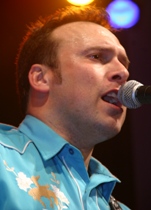 BM:
What is more important to you when you write: The words or the music?
BM:
What is more important to you when you write: The words or the music?
HW: I think itís the lead guitar and the lead
vocal parts, (just kiddingÖ (ed.: Heath plays and sings lead)
GK: Öand I donít. Actually most musicians think
itís the music and most listeners think itís the words. So both is important.
Some musicians canít tell you the words to the songs they love while fans
know the words but hardly the melody.
BM:
Would you rather write a song that lasts 100 years or one that sells 100 million
times?
GK: I vote for the 100 million (laughs). A hundred
years from now, at least my grand kids still have the money.
HW: Yeah I gotta go with Greg on this one (laughter)Ö.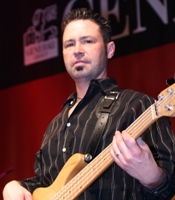
GK: Ösorry, sounds like kind of capitalism.
BM:
Youíve had ups and downs in your career. What do you suggest to newcomers
if they want to make it in this business?
HW: Go to college and do something elseÖ No,
seriously, if they really want to make it my advice is to go in front of an
audience every night. Play as often as you can. Thatís the place where you
can tell the professionals from the non-professionals. Those people who can
comfortably perform in front of an audience and make it seem like itís their
second nature, those are the proís.
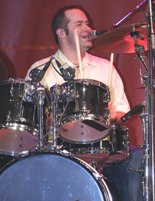 GK: The music answer is itís half music and half
business. But the business answer is you have to think outside the box. The
business has changed so much in the past ten years, itís not even close to
what it used to be. You have to learn and accept that internet is part of
our future instead of fighting downloads, as an example. Selling CDís is pretty
soon becoming a thing of the past and if you donít realize that, your business
model is broken.
GK: The music answer is itís half music and half
business. But the business answer is you have to think outside the box. The
business has changed so much in the past ten years, itís not even close to
what it used to be. You have to learn and accept that internet is part of
our future instead of fighting downloads, as an example. Selling CDís is pretty
soon becoming a thing of the past and if you donít realize that, your business
model is broken.
BM:
If you compare the music business at the time of your debut album and hits
like Daddyís Money and how it acts today: What has changed in your opinion?
GK: Pretty much everything. When we started,
a record company did everything from marketing to sales and management. Now
sales have almost become secondary to downloads. We canít win that fight.
Figure out how to let downloads occur and still make money. The process of
label mergers has only left two or three big ones on the market, thatís another
change. On the other hand thereís a bunch of great independent labels coming
new or back into business.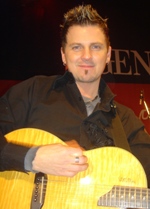
HW: There are also more artists available to
the audience due to the ability of promoting their music over the web and
not being dependent on having a record contract. The way people listen to
music has changed too. Digital satellite radio stations are available for
all varieties of music.
BM:
If people look back on your lifes in 50 years, what youíd wish they say about
you? Probably nothing because you didnít write that hundred year lasting songÖ
(laughter).
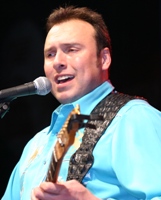 GK:
I hope we will have some type of legacy. We were fortunate to do some tours
for the army where the soldiers told us that we made a difference. If somebody
remembers us in fifty years, I hope they say they had fun when they came to
see us. Weíre here to entertain after all.
GK:
I hope we will have some type of legacy. We were fortunate to do some tours
for the army where the soldiers told us that we made a difference. If somebody
remembers us in fifty years, I hope they say they had fun when they came to
see us. Weíre here to entertain after all.
HW: If a grandpa tells his grandkid in fifty
years about that great show we did in Switzerland, then to me that would be
the biggest compliment. Thatís success.
BM:
Itís quite difficult these days to get airplay. What advise would you give
to radio executives if they would listen to you?
GK: Well, thatís certainly a fantasy question
(laughter). The radio guys forget that thereís more to radio than just selling
ads. I sometimes get frustrated to hear the Top-40 over and over and over
again. I just hope that there will be more stations that play local acts.
And thankfully there are some these days. Thereís a lot of good music out
there beside the Top acts.
BM: Isnít that also because the radio DJs canít
play anymore what they want but what the radio executives put together for
their show?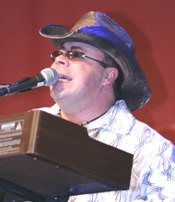
HW: Thatís true. Iíd like to see it going back
more to local level. These days someone on the west coast may decide what
the people in the eastern part of our country have to listen to. But tastes
are different. I wish that radio stations would realize that most people know
exactly what they want to hear on the radio.
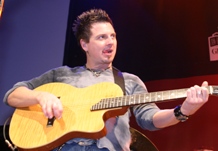 GK:
Absolutely. A lot of people think if they call their DJ and make a request.
Fact is, if they were gonna play it anyway, you get it. Otherwise you donít.
GK:
Absolutely. A lot of people think if they call their DJ and make a request.
Fact is, if they were gonna play it anyway, you get it. Otherwise you donít.
BM:
If you could travel back in time, which era would you go to?
GK:
Interesting questionÖ
HW: Ö Iíd go back to the Old West. I am a big
fan of the cowboys and that era back when the settlers came in. I am from
Oklahoma where April 22, 1889 was a big day in the history because of the
Oklahoma Land Run. Iíd go back to that day and maybe get a little
bit bigger ranch than the one I have today (laughs).
GK: Iíd go back to the days of the great depression.
I am glad I didnít have to go through it but Iíd like to see how it was back
then. Or the Sixties were a great time, politically and music wise. So Iíd
like to go there, too.
BM:
If you won the lottery and never had to work again, how would you spend your
time?
GK: Well, I wouldnít change a thing.
HW: I might spend more time on my ranch. Weíre
still playing around 50 to 75 gigs a year.
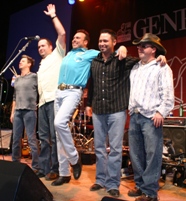 GK: I would make our gigs more comfortable. With
a few millions you could buy a big bus. I would also diversify my investments
because I donít like to have all my eggs in one basket and somebody else carrying
it.
GK: I would make our gigs more comfortable. With
a few millions you could buy a big bus. I would also diversify my investments
because I donít like to have all my eggs in one basket and somebody else carrying
it.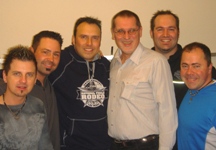
BM:
If you would interview Ricochet, what question would you ask the guys that
I did not ask?
HW: How can I get your products like T-shirts
and CDs (laughter).
GK: Whatís your website (laughter).
BM:
What
a question... Thanks a lot for the interview.
GK: Thank you, these were really interesting
questions. You know, a lot of people ask us simple stuff like how did we get
our name and so on (laughter).